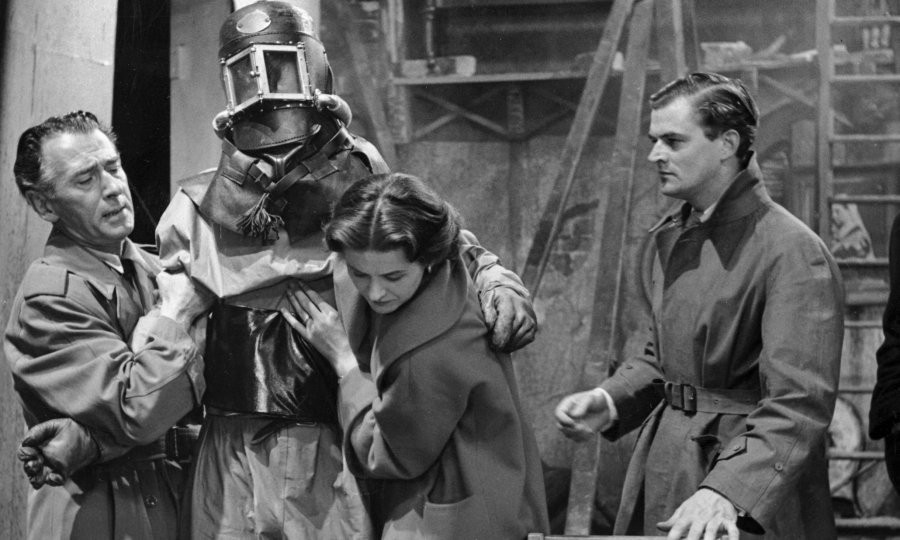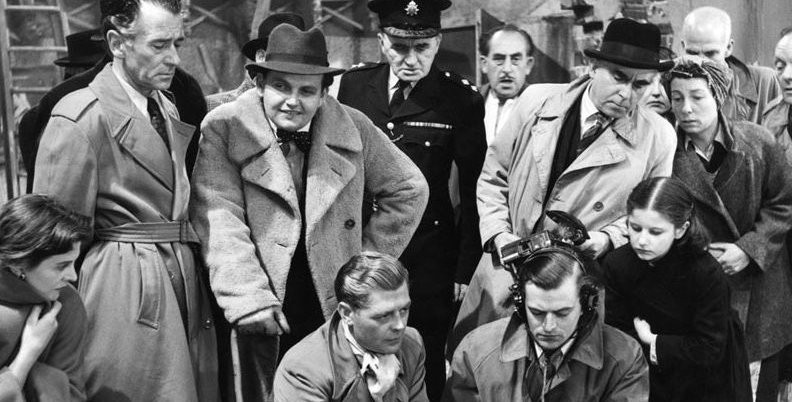
The Quatermass Experiment
The stirring notes of Holst's "Mars, the Bringer of War" grab our attention as the dark television screen slowly illuminates. There, behind swirls of smoke, three words fade into view: The Quatermass Experiment. While we ponder just what this title means, they fade away, replaced by this brief description: "A thriller for television in six parts, by Nigel Kneale." So began a hugely important part of the history of television.
Today, very little of the original Quatermass production survives. Only the first two episodes were transferred to film, by means of a primitive, unreliable process that was deemed too expensive and of too poor a quality to continue for the duration. The remaining four instalments are lost forever, remembered only by those who saw it on its live broadcast almost sixty years ago. Far more will be familiar with the story through Hammer's film remake from two years later. The movie The Quatermass X-periment is a classic production, and, as Hammer's first horror film, a historical milestone itself; nonetheless, it pales when compared to its forebear.
Even on the strength of these two surviving episodes, the quality of the production shines through. The Quatermass Experiment was a gamble for the BBC - a serial drama written specifically for television, featuring a science fiction storyline and aimed at an adult audience. Nothing of this kind had been attempted before. These were the early days of television; previous forays into the still niche genre of science fiction has been adaptations of respected novels and short stories, or frothy adventures intended for children. With its serious, horrific, scientifically-minded tone, Quatermass changed all this.
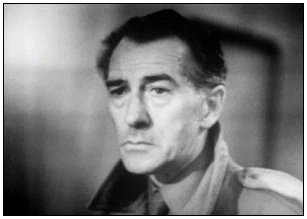
Reginald Tate plays Professor Bernard Quatermass. Tate was the first choice for the role, and, in my opinion, has never been bettered. He perfectly captures the character of Quatermass; a scientist, striving for knowledge in the face of the unknown, yet burdened with the guilt that he is putting lives at risk with his quest. Tate convinces as a genius, an accomplished scientist, idealistic yet practical. At the same time, he is a very human figure, tired, weighed down by stress, and displaying a warmth that some later interpretations of the character wholly lack. He still refuses to take the nonsense of ministers and stuffed-shirts, yet he shows genuine fondness and compassion to his colleagues, the Carroons. The British Experimental Rocket Group is, even in the little we see of it here, a believable creation. Extremely British, terribly proper, its nonetheless a place where colleagues have become friends and speak to each other as such. A telephone link-up to Woomera in Australia provides a little contrast, although they're almost as proper as the British.
There are some surprising inclusions in this group. We can easily look back at the Fifties as being patriarchal, elitist and still imperialistic, and there's an element of that here. The first manned mission to space is British, and quite right too. However, one of the three astronauts is German, in a broadcast only eight years after the end of WWII. What's more, Judith Carroon, sympathetically played by Isabel Dean, is a vital part of the Group's scientific staff. Other productions might easily have made her nothing more than astronaut Victor Carroon's wife or sweetheart, and not worried about giving her a more justified place in the experiment. What's more, she's been having an affair with one of the other members, Dr Gordon Briscoe - hardly the passive female role we might expect from a production of this era.
The first episode, Contact Has Been Established, is a beautiful piece of television. It's refreshing, in the modern age, to watch an example of science fiction in which special and visual effects play so little part. The worry and fear displayed by Quatermass and Judith are enough to convince us of the danger the missing astronauts are facing, drifting thousands of miles off course in space. When the spacecraft crash-lands in Wimbledon - bringing the core events right into the viewers' own territory - the actors play against little more than a painted backdrop, with the crackling of flames in the background. Quite rightly, the script focuses not on the science, nor even, for the moment, on the astronauts, but on the locals whose lives have been disrupted by the event. The use of news bulletins to illustrate and narrate the events, while seeming cliched today, is a simple yet highly effective way of getting the more difficult or outlandish concepts across to an audience unused to them.
What's surprising is just how funny some of this material is. The little old lady, rescued from a flattened house, is more worried about Henry, her pet cat, than anything falling from space. Magnificently played by Katie Johnson - the landlady from The Ladykillers, no less - this scene epitomises how the serial focuses on the people, not esoteric matters of science. Plenty more humour is to come from the encroaching mass of people, most notably the marvellous Paul Whitsun-Jones as flamboyant reporter James Fullalove. With his rich, fruity performance, he manages to get the viewer rooting for him as much as for Quatermass, despite them being at loggerheads for much of the story. While he pushes for his news story - "I need something to denounce!" - Quatermass takes charge of the situation. Finally, after what seems like an age, the capsule opens - but only one man exits. The cliffhanger ending, as the spacecraft is shown to be, impossibly, empty, is tremendously eerie and tantalising.
Episode two, Persons Reported Missing, focuses almost solely on this mystery and its fallout. It seems rather bizarre now to have the local constabulary barging in, treating this as if it were a regular missing persons case; surely, a private or military investigation would be made, rather than civilian police? Sadly, there is little of Ian Colin's Inspector Lomax in this surviving episode. While Fullalove continues to push, Quatermass is visibly shocked, unable to quite pull himself together to make a convincing statement to the police and press. Most distressingly, Judith is now confronted with her husband, returning to Earth a broken man. Duncan Lamont's performance as Victor Carroon, although silent for much of the episode, engenders such sympathy that it's easy to see why Judith changes her plans to leave him for Gordon and is once more by his side.
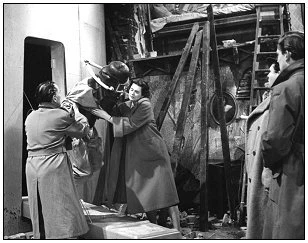
The police investigation, though an odd inclusion, allows the ingenious device of fingerprinting to illustrate just what strange event befell the crew. Carroon's fingerprints appear as a mixture of his own and those of his two crewmates. This is then expanded, as we learn of his changing bone structure, and then, most effectively of all, his sudden speaking of German, something he should be incapable of, revealing his merging with his German crewmate Ruckenheim. The use of the footage to show the events leading up to the launch is similarly effective, engendering our sympathy further for those three men we had not previously got to know. It also features one rather sinister joke, as Victor promises to "bring something back" for his wife. Indeed he did, but not what he was expecting (indeed, Bring Something Back...! was a working title for the serial). Finally, as the episode closes, we are back aboard the spacecraft, as the team discover something organic and alien...
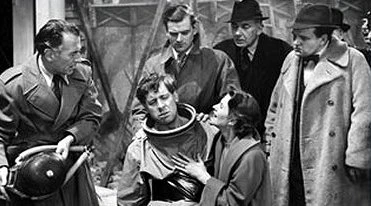
It is a crushing shame that the remaining four episodes will never be seen again. An infiltration by foreign agents, Carroon's slow transformation into something capable of ending all life on Earth, and the final confrontation between Carroon and Quatermass in Westminster Abbey, are all lost. Nonetheless, these first two episodes remain exceptional examples of early television, and are essential viewing for anyone interested in science fiction or television history in general.
Published on February 21st, 2019. Written by Daniel Tessier (January 2012) for Television Heaven.









